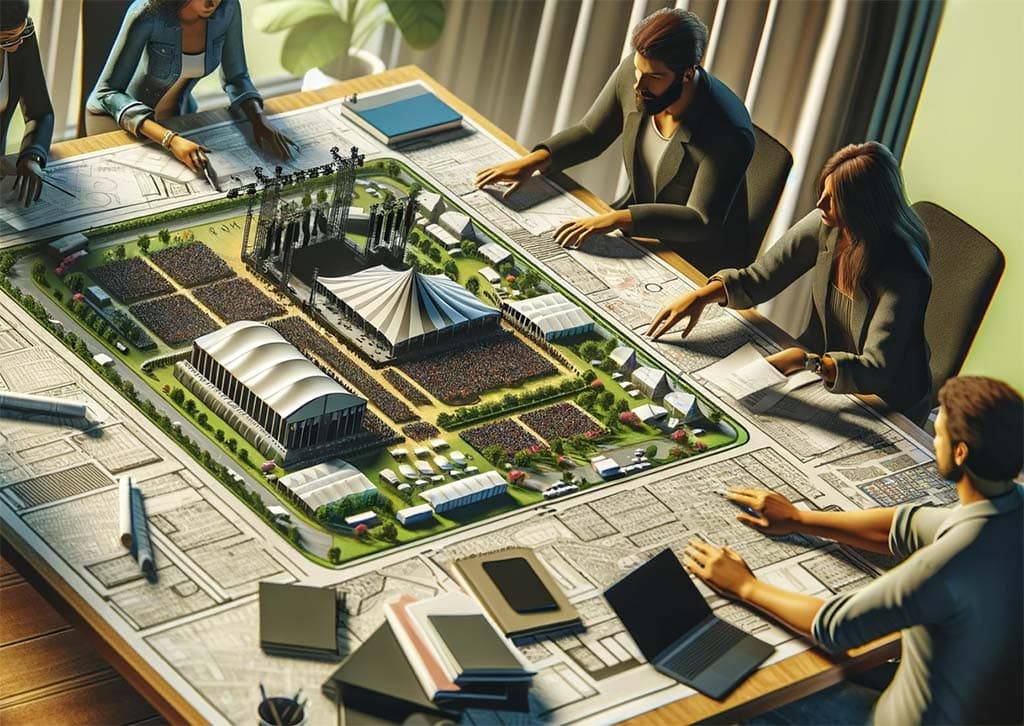The process of organizing a music festival or concert begins with careful planning and the selection of an appropriate venue. This crucial first step involves more than just choosing a location; organizers must consider factors like the venue’s size and capacity, its accessibility for attendees, and how well it fits the event’s theme and style. Addressing logistical aspects such as crowd flow, sound quality, and staging requirements is essential. Furthermore, compliance with local regulations, such as noise ordinances and safety standards, is mandatory. Selecting the right venue is foundational to the event’s success as it impacts everything from the audience’s comfort and enjoyment to the performance quality. This stage sets the groundwork for what will become a memorable experience for both performers and attendees.
Booking Artists and Scheduling Performances
The heart of any music event is its lineup of artists. The process of booking performers involves much more than simply choosing popular acts. Organizers must negotiate contracts, manage artists’ schedules, and often accommodate complex technical riders. The lineup needs to reflect the festival’s identity and appeal to its target audience, balancing well-known headliners with emerging talent. Scheduling performances is a strategic task, as it influences audience engagement and overall event flow. The aim is to create a seamless experience where each performance complements the next, keeping the audience captivated and making the event a comprehensive musical journey.
Setting Up Stages and Sound Systems
Constructing the physical infrastructure of a music festival or concert is a task of immense scale and complexity. Setting up stages, installing sound systems, and arranging lighting are critical elements that define the audience’s experience. This phase requires a skilled team of technicians and engineers to ensure that every aspect, from the sound quality to the visual effects, is perfectly executed. The layout of the venue, including the placement of stages, sound equipment, and audience areas, is meticulously planned to provide the best possible experience while ensuring safety and meeting technical requirements. This stage setup not only supports the performances but also contributes to the overall atmosphere of the event.
Crowd Management and Security
One of the most critical aspects of organizing a music event is ensuring the safety and comfort of the attendees. Effective crowd management strategies are vital for a smooth-running event. This includes planning the layout of the venue with clear entry and exit points, emergency access, and the strategic placement of facilities like restrooms and food stalls. Security is a top priority, requiring a well-trained team to handle various situations discreetly and efficiently. Organizers must also consider aspects such as crowd density, movement patterns, and emergency procedures. A well-managed event not only ensures the safety of the attendees but also enhances their overall experience by creating a secure and comfortable environment.
Utilizing Technology in Event Management
In today’s digital era, technology plays a pivotal role in the organization of music festivals and concerts. The use of advanced ticketing systems, RFID wristbands for entry and payments, and mobile apps for live updates significantly streamlines the event management process. These technological tools aid in efficient crowd control, enhance security measures, and provide real-time information to attendees. Social media platforms are utilized for marketing, engaging with audiences, and creating buzz around the event. On the technical front, state-of-the-art sound and lighting systems transform performances into spectacular shows. The integration of technology in event management is not only a trend but a necessity, helping organizers orchestrate complex logistics, enhance attendee experiences, and ensure the seamless execution of events.
Post-Event Activities and Feedback Collection

The conclusion of a music festival or concert marks the beginning of the post-event phase, which is as crucial as the preparation and execution stages. This phase involves dismantling stages, clearing the venue, and ensuring that the site is returned to its original state. Organizers also focus on debriefing teams, settling accounts, and reviewing the overall success of the event. Collecting feedback from attendees, performers, and staff is a key component of this stage. This feedback provides valuable insights into what worked well and what can be improved, helping organizers learn and adapt for future events. The post-event activities are essential for maintaining sustainability and ensuring the long-term success of music festivals and concerts.
Conclusion: The Symphony of Event Organization
Organizing a music festival or concert is akin to orchestrating a symphony, where every element must be in harmony to create a successful event. From the early planning stages to the final notes of the post-event activities, each step requires meticulous attention to detail, coordination, and a passion for delivering an unforgettable experience. The challenges of managing logistics, technology, artists, and crowds are significant, but the reward lies in seeing the joy and excitement of attendees, united by their love for music. As the industry continues to evolve, so too will the art of organizing music events, promising even more innovative and exhilarating experiences for audiences around the world.